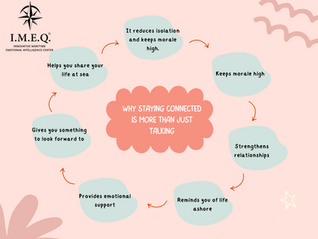Winter blues and seasonal affective disorder
- IMEQ CENTER

- Nov 22, 2023
- 4 min read

While the holiday season can bring about some unwanted stress, there are some scientific reasons why your mood can be affected by the seasons.
With the dark nights of winter and the colder days upon us, many people start to feel more lethargic, less motivated and experience lower moods than usual. 1 in 3 people, in the UK alone, suffer these general symptoms, with some describing a need for more sleep, while others experience less enjoyment in hobbies and activities. While many people experience low moods during the winter months, 1 in 20 suffer from a more severe form known as Seasonal Affective Disorder (or more aptly ‘SAD’), which can have a significant impact on a person’s daily life, impeding their ability to work or to socialise. A crew member’s ability to perform in their role is crucial for not only the safe transportation of goods, but also to stay safe and prevent injury to themselves and others. Seafarers can be affected by SAD just like the rest of us, and together with the daily stresses of the job, it can be easy for crew to feel overwhelmed, both mentally and physically.

What causes Seasonal Affective Disorder (SAD)?
The conditions of the winter season, such as shorter days, colder temperatures and lack of natural sunlight, can have an impact on a person’s energy levels and overall mental and physical health, with the distinct lack of sunlight being a crucial factor. Natural sunlight is an important element in any healthy lifestyle, being an invaluable source of vitamin D, as well as affecting a person’s serotonin levels and internal body clock.
Vitamin D The human body uses sunlight to generate vitamin D, which is crucial for absorbing calcium and maintaining healthy bones, teeth and muscles. Serotonin The hormone that affects mood, decision making, social behavior and other cognitive functions. Internal body clock A person’s exposure to sunlight can affect their internal body clock, resulting in fatigue.
What to look out for
Greater need for sleep
Agitation or anxiety
A loss of pleasure or interest in normal everyday activities
Persistent low mood
Less energy / fatigue
Trouble concentrating
Increased appetite / weight gain
Becoming less sociable
Minimising the effects of SAD There are many changes that can be made to mitigate the effects of SAD during winter, these include:
Try to get as much sunlight as possible during the day. If this is not possible, a ‘light box’ that emits light similar to that of the sun can be beneficial.
Include more vitamin D in your diet by eating vitamin rich foods, such as fish, oranges and eggs.
Try to exercise for 30 minutes a day.
Where possible, try to avoid stressful situations, and take steps to manage your stress levels. Additional resources on physical and mental health for seafarers The Crew Health team are in regular contact with industry experts throughout the year, sourcing the latest advice. For seafarers’ and Members’ interest, the team create Crew Health advice bulletins on how to stay safe and healthy. All the bulletins can be found on the Club’s website. Further support on mental health is widely available from our charity partners in the maritime sector, who work closely with seafarers.
The Sailors’ Society Wellness at Sea Programme and App Seafarers are advised to keep up-to-date on health initiatives and to monitor their own physical and mental health. Health, exercise and diet monitoring apps are proving very popular amongst the workforce. Apps such as The Sailors’ Society Wellness at Sea App work in conjunction with their enhanced training programme to actively promote positive crew wellbeing.The app provides interactive challenges on each of the five elements of Wellness at Sea training: Social, Emotional, Physical, Intellectual and Spiritual wellness.App users receive daily feedback, which enables them to monitor their progress (Android and iPhone compatible). For more information, please visit www.sailors-society.org/wellness. The UK P&I Club Crew Health team charity partners can also advise on how crew can maintain their physical and mental health while at sea, as well as what they can do if they feel overwhelmed. ISWAN’s SeafarerHelp SeafarerHelp is the free, multi-lingual helpline for seafarers and their families, available 24 hours a day, 7 days a week, 365 days a year.
To contact SeafarerHelp: SMS: +44 (0)762 481 8405 Skype: info-seafarerhelp.org Live chat:www.seafarerhelp.org Email: help@seafarerhelp.org Call collect: +44 (0)207 323 2737
The UK P&I Club Crew Health team regularly meet with the key maritime charities, Sailors’ Society, Mission to Seafarers and Apostleship of the Seas. All these charities offer the support of telephone helplines and port chaplains, to whom seafarers can speak in the utmost confidence.
To contact a Mission to Seafares chaplain, please visit www.missiontoseafarers.org
Apostleship of the Seas port chaplains may be contacted via their website www.apostleshipofthesea.org.uk
Sailors’ Society operate a 24/7 helpline for seafarers (Sailors Society (sailors-society.org)) Call +1 938 222 8181 for assistance.
Additionally the Club team also collaborated with Human Rights at Sea to sponsor the publication of “Remaining Resilient after Traumatic Events”. This booklet offers practical advice on handling difficult situations. It is available in English and Tagalog in the publications section of the UK P&I Club website as a post incident guide for all seafarers.
UK P&I Club are contributing Loss Prevention and Crew Health materials for the IMEQ Seafarers App as part of our established partnership. For further information on the UK P&I Club Loss Prevention and Crew Health activities please see www.ukpandi.com





































































































Comments